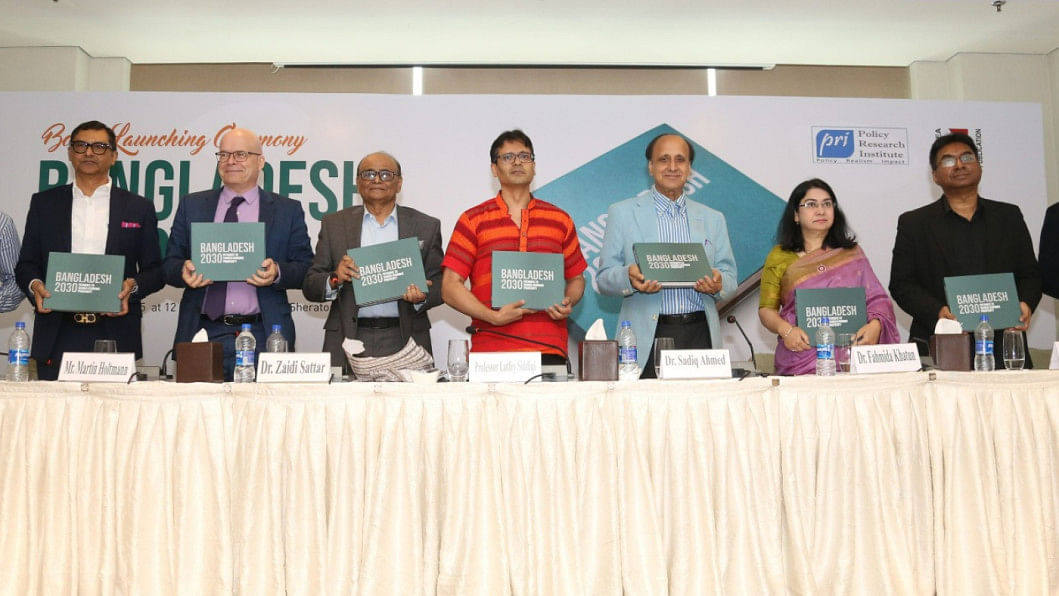Business syndicates blocking reforms: chief adviser’s envoy

Business syndicates are active in almost every sector in Bangladesh, Chief Adviser's Special Envoy on International Affairs Lutfey Siddiqi said today.
"One of the main reasons we are unable to bring about structural reforms is that many in the business community secretly reach understandings with the government to serve their own interests," he made this comment at a book launch event.
The Policy Research Institute of Bangladesh (PRI), in collaboration with Nymphea Publication, hosted the launch of the book "Bangladesh 2030: Pathways to Shared Economic Prosperity" today at Sheraton Dhaka.
"I have a particular bias in favour of business, because I have spent most of my professional career in the private sector," Siddiqi said.
"But I have to say that one of the reasons that we cannot make systemic changes whether it's with NBR or elsewhere is that members of the private sector strike their own deals with the government," he added.
"Many people come to seminars and make big statements about the need for structural reforms. But later, it turns out that they themselves have secretly made deals with a ministry—undermining the entire effort for change," he said.
Siddiqi also said that after the disclose of the white paper, many might feel that its outcomes have faded or come to a halt."
"But I can say with certainty—both I and many of my colleagues are using the recommendations of the white paper in our daily work and decision-making. The chief adviser is doing the same."
Efforts to implement the white paper's recommendations are ongoing although visible progress may not be apparent to the public, he said.
The government is actively working on these suggestions, with the focus now on how to effectively implement them, he added.
Sadiq Ahmed, vice chairman of the PRI, who introduced the book, said they compiled this book as a message of hope that Bangladesh will navigate the economy from the present stagflationary phase to a path of sustained and shared economic prosperity.
This is not based on speculation or wishful thinking, he said.
It draws on the rich history of over fifty years of development experience, where a resilient nation emerged through the combined efforts of farmers, non-farm workers in the domestic economy, guest workers abroad, and the youth community, especially student, he added.
They have consistently shown the way forward, overcoming challenges such as weak governance, policy mistakes, external pressures, and natural disaster, he said.
Syed Nasim Manzur, president of the Leather and Footwear Manufacturers and Exporters Association of Bangladesh, said the last major reform in the country's tax system took place in around 2011.
High tariff is one of the biggest obstacles to doing business, he said.
"We are now talking about free trade agreements, but one of the major barriers to achieving that is the high tax rate. Therefore, it is essential to reduce tax rates immediately," he added.
Fahmida Khatun, executive director of the Centre for Policy Dialogue, said the country's politicians, businesspeople, and both civil and military bureaucracies have formed a powerful nexus of vested interests.
This is the main reason behind the lack of interest in structural reforms, she said.
This nexus considers it more profitable for them if no policy changes are made, she said.
No significant changes have been observed in key institutions such as the central bank, the Anti-Corruption Commission, and the National Board of Revenue, she added.
Moreover, institutions in other crucial sectors—such as the parliament, judiciary, and administration—are also failing to play an effective role, she added.
Selim Raihan, executive director of the South Asian Network on Economic Modeling, said while political parties may show some interest in minor reforms, they are not willing to pursue major or structural reforms.
This tendency has persisted for the past two decades or more.
It is not a problem of any single political party but rather a characteristic of all major parties, he said.
However, a deeper concern is the lack of strong demand for reforms from civil society and the public, he added.
Martin Holtmann, country manager for International Finance Corporation Bangladesh, Bhutan and Nepal, also spoke at the event moderated by Zaidi Sattar, chairman of PRI.

 For all latest news, follow The Daily Star's Google News channel.
For all latest news, follow The Daily Star's Google News channel. 



Comments